OUR BURNING PLANET 168
Waste not, want not: The ethos of upcycling, repurposing and reusing
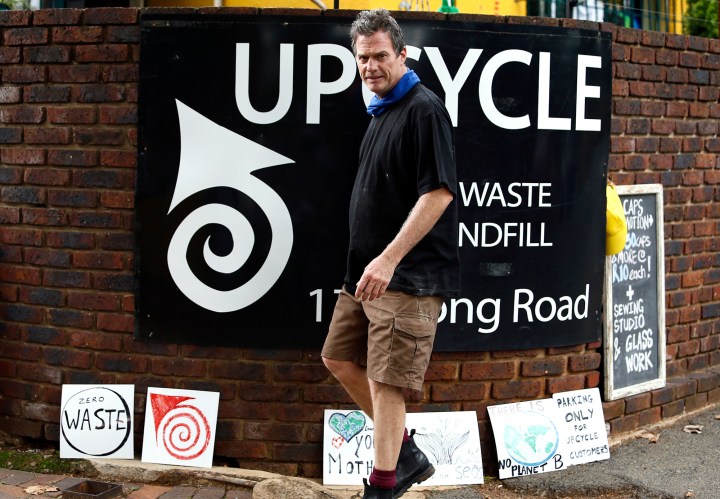
Is this how the green economy could work? A little shop in a small Johannesburg suburb is leading the way by repurposing or recycling anything and everything.
First published in the Daily Maverick 168 weekly newspaper.
If you wake up tomorrow and the world has been turned into a giant, sustainable food garden, that means Mark Fruhauf’s dream has come true.
Fruhauf and his wife, Winnie McHenry, are the power duo behind the Greymont Upcycle Zero Waste to Landfill store in a nondescript space in a small suburb in Johannesburg.
Sustainability is one of the key pillars behind their work and the store, which has become a bit of an icon for how the green economy can work.
It’s what drives their personal lives too. Their home, at the moment, is a complete mess as they systematically go through all their possessions to sort out what they really need so the rest can be recycled or repurposed.
Ask Fruhauf when he last visited a mall and it takes him a few minutes to think back.
“I hate shopping. I hate spending money on anything I can’t reuse, recreate, upcycle. The things I buy are for the business. The last time I bought something for us at home was a new set of bowls when I finally broke the last in the set we had.”
The upcycle store is based on this principle of reusing and repurposing rather than sending things to the landfill – showing people the value of inventing another purpose for something rather than letting it go to waste.
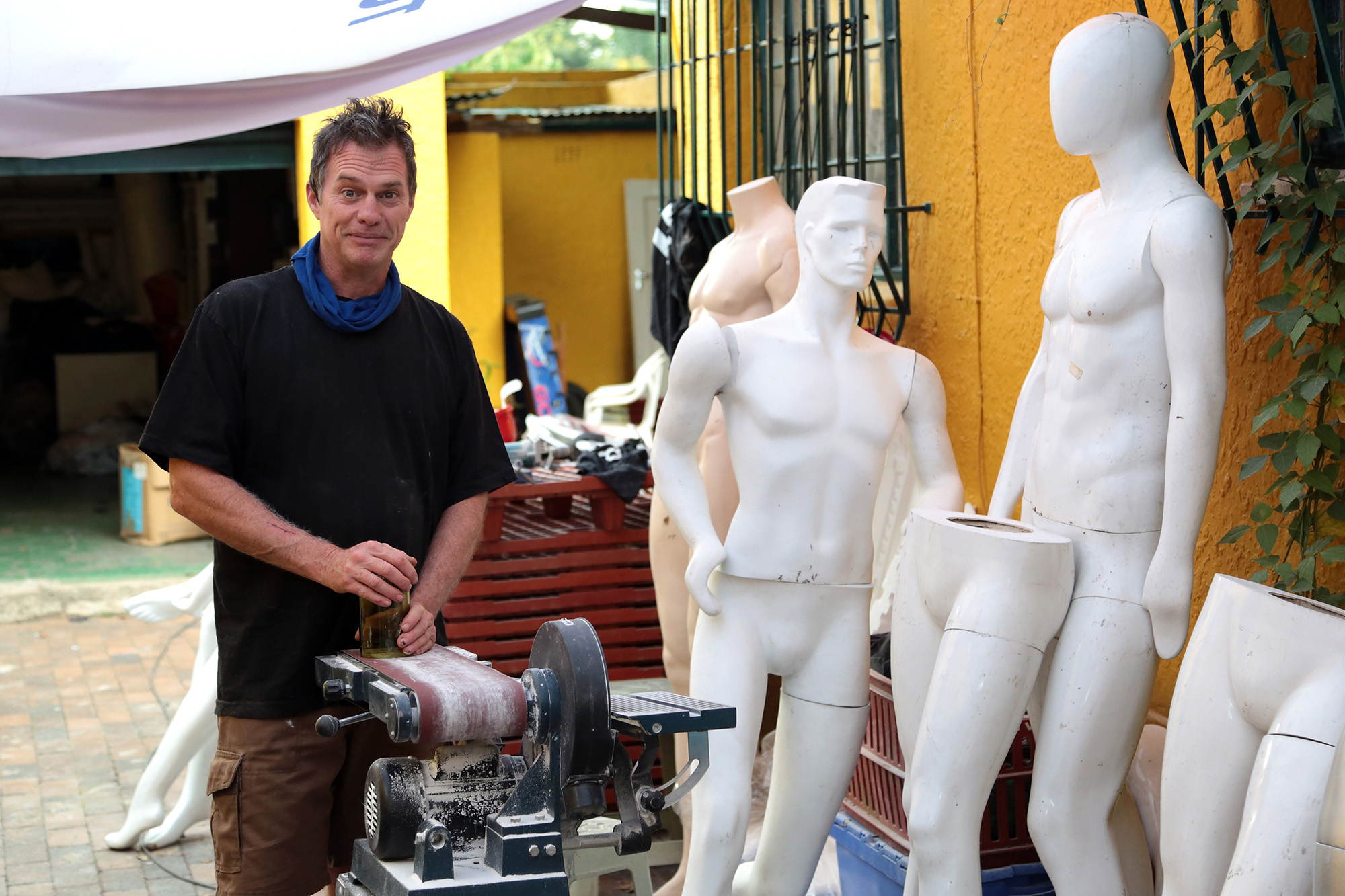
Mark Fruhauf. The upcycle store is based on the principle of reusing and repurposing rather than sending things to the landfill. (Photo: Felix Dlangamandla)
“If I had superpowers I would immediately change how everybody consumes things, their spending habits. Why do you need 14 pairs of shoes? Why get a new dinner service, just because it’s a new colour, when the one you have is perfectly usable?
“I’d also change industries that manufacture for consumerism and not for demand. If we can change that, it would make a massive difference to the amounts of things produced. We wouldn’t need so much of what we have.”
He believes that greed is at the core of consumerism – greed created by industries to make more money. But he says it’s also fuelled by consumers who are led to believe blindly that they need more things.
“Look at something like a shampoo bottle. When the shampoo is finished many of us simply throw the bottle away instead of repurposing it, say using it for your dish soap, and using it until it is really broken. Everything you have has the possibility of another life beyond its initial use. Don’t throw anything away needlessly. Find a use, be mindful.”
He is encouraged by people like Japanese lifestyle guru Marie Kondo, who are teaching people to live minimally. “A minimalist lifestyle has become a big trend but it really has to be a lifestyle if we are going to effect change.”
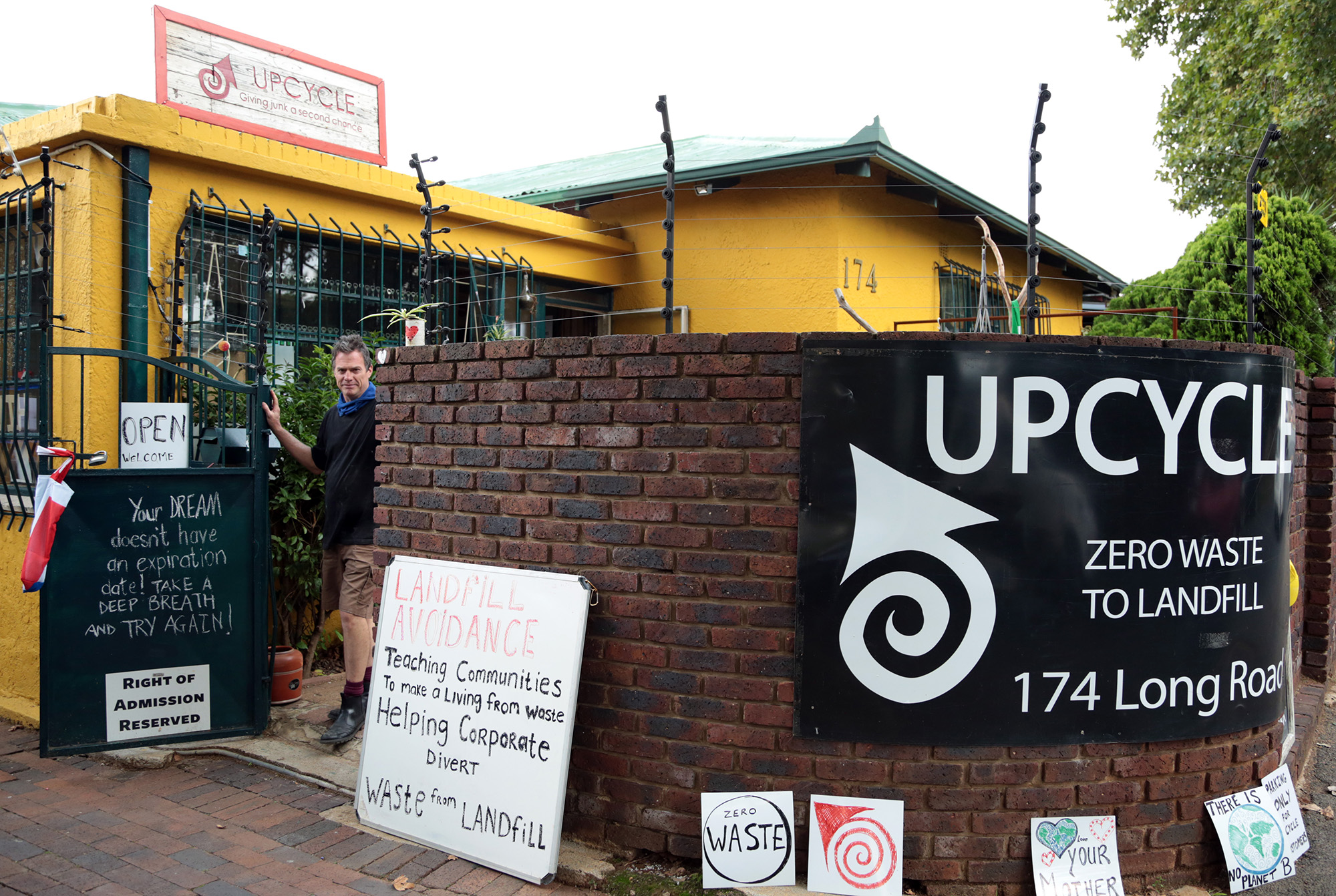
The Upcycle store, which has been operating for a little over two years, is a good example of how a circular economy, which is based on the economic principle of eliminating waste and the continual use of resources, can work. (Photo: Felix Dlangamandla)
The Upcycle store, which has been operating for a little over two years, is a good example of how a circular economy, which is based on the economic principle of eliminating waste and the continual use of resources, can work.
The store is a treasure trove of unused corporate items that would have gone into landfills because there was a problem with the company’s logo, or their logo has changed, or a company just has too much stock, or has gone out of business – any number of reasons these items cannot be sold, because branding rules prevent them from being sold or donated.
Working with businesses, Upcycle gets these items, removes the logos and then sells the products cheaply. Think pens, diaries, cups, mugs, backpacks, footwear, T-shirts, braais, camping chairs, umbrellas and more.
Upcycle also teaches unemployed people to repurpose goods that they can go on to sell.
The couple are not only changing the way they have an impact on the Earth but are changing the way others think of their contribution to waste and consumerism, all the while altering lives for the better.
They have trained communities from across South Africa to become waste entrepreneurs using their model of changing waste into something valuable, and 19 young people from various communities are on a year-long training course with Upcycle to learn how to become upcycle entrepreneurs.
They are also working with international businesses to secure funding to develop upcycling centres, the aim being to develop colleges to teach and train people to upcycle. The dream is to create retail centres for upcycled goods and to create the consciousness in consumers to buy local and from upcycling centres rather than retail stores.
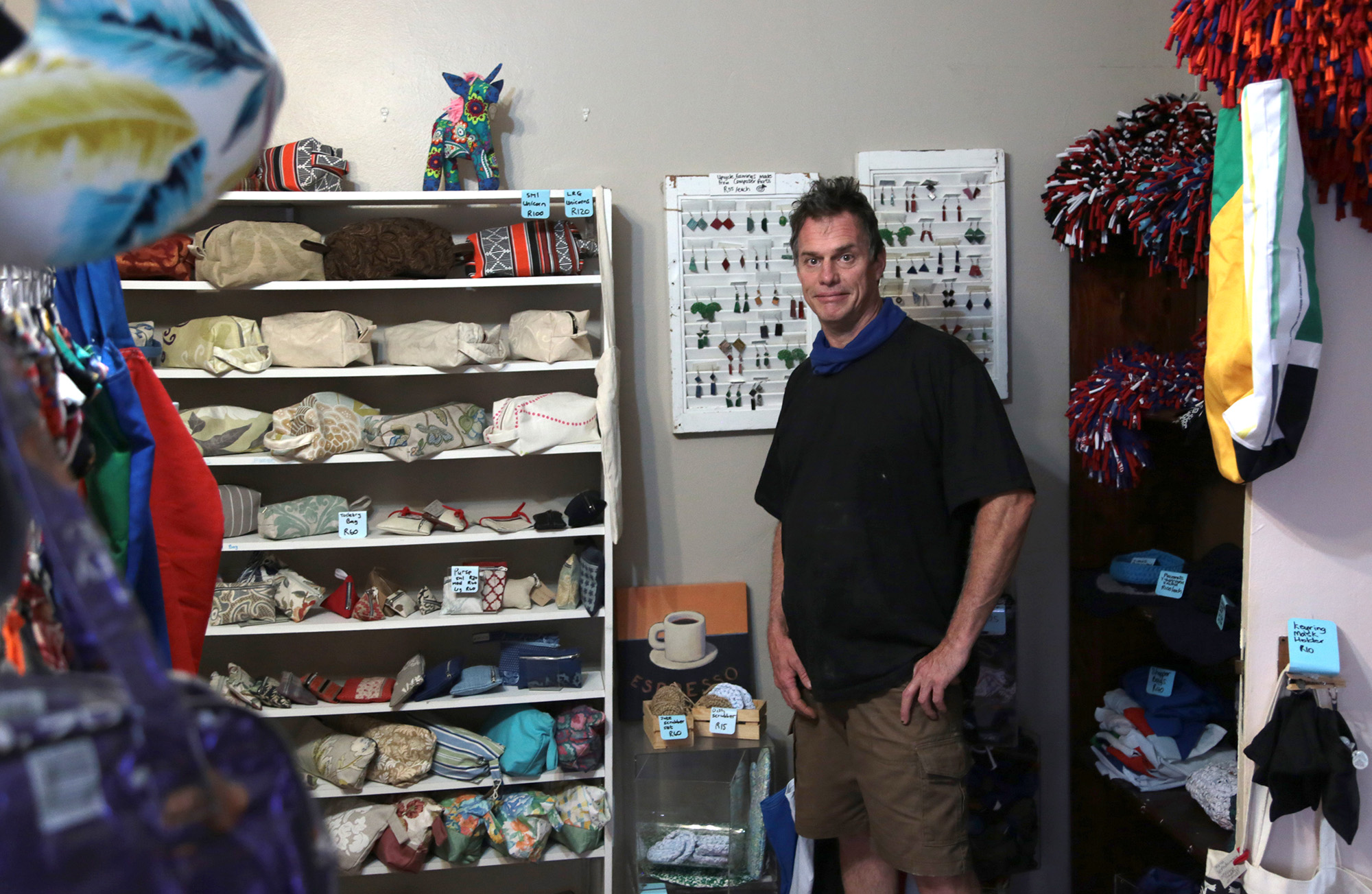
Mark Fruhauf believes that greed is at the core of consumerism – greed created by industries to make more money. (Photo: Felix Dlangamandla)
Fruhauf and McHenry met more than 17 years ago through an online dating site, and it was “Winnie who woke me up to an upcycle ethos”, he says.
“I think the main thing that kick-started this lifestyle was when I became a vegetarian. I have always been conscious of the impact I have on the planet, but the biggest change happened then. This lifestyle choice meant that we really had to be careful and aware of everything that we do. To think about our impact, every act and everything that flows from our decisions.”
It is this ethos that has seen Upcycle saving 23 tons of items from entering landfills.
Furhauf says he often thinks about a scenario in which Earth is visited by aliens who give us an ultimatum to prove to them why they should not blow us up.
“I don’t think it will be a very good outcome for us. But we are streaks ahead of where we were 10 years ago. There have been big changes, but we as a planet or as people still have to do a lot and learn before we can consider ourselves to be conscious.”
What does he think about the future of the planet?
“I am very positive – we are making headway. I worry that we are not doing it fast enough, but I feel positive about the changes I am seeing. As time goes by it’s going to accelerate more and more, there is sufficient momentum. Maybe in my lifetime we will see a decline in certain industries because they are no longer welcome.
“There was a time, for example, when McDonald’s would not dream of serving a vegetarian burger. Popular opinion is bringing about change. It starts as a drop in the ocean and expands like a ripple.” DM168
This story first appeared in our weekly Daily Maverick 168 newspaper which is available for free to Pick n Pay Smart Shoppers at these Pick n Pay stores.
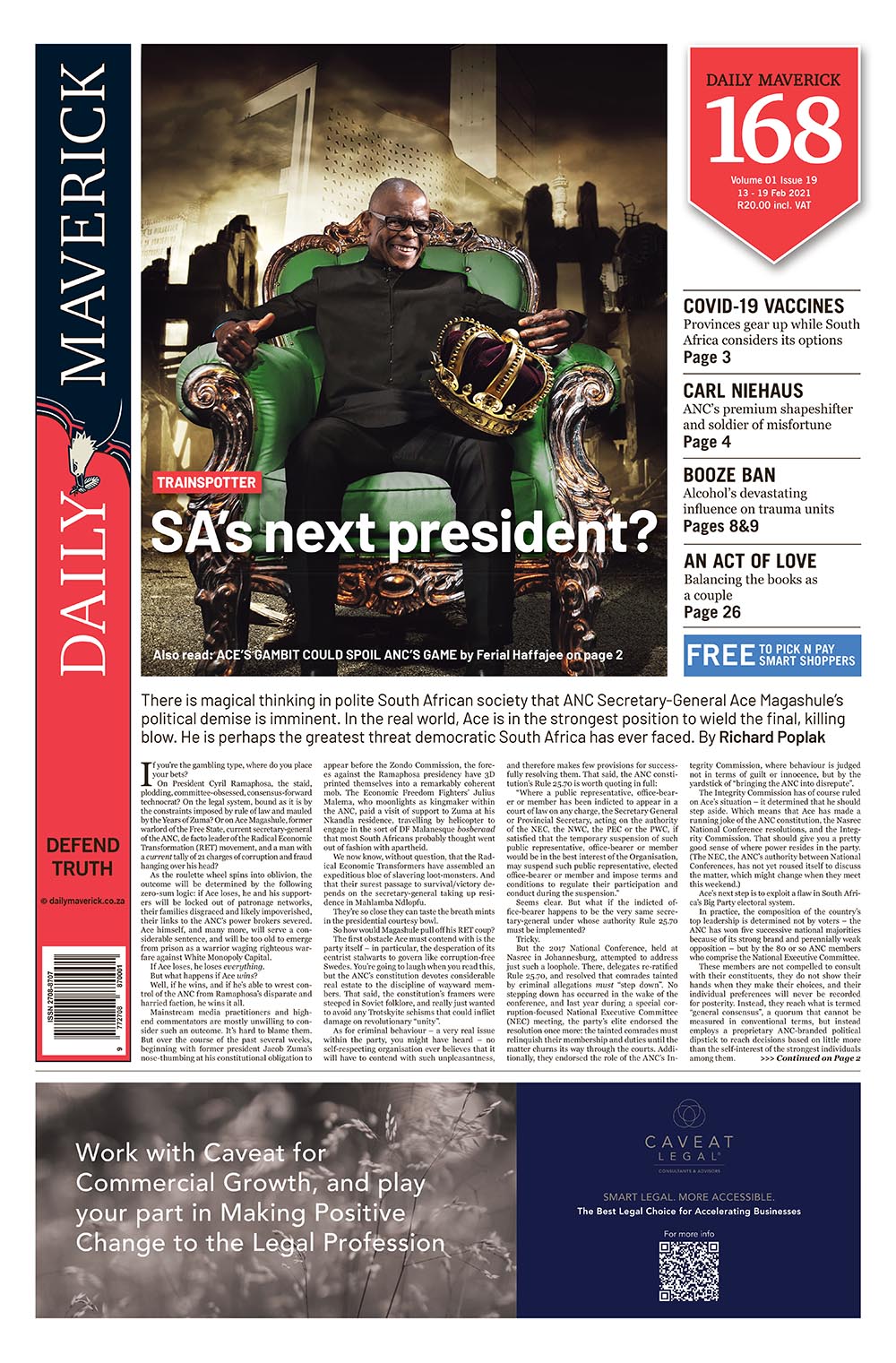









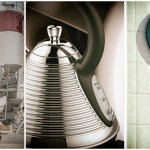








 Become an Insider
Become an Insider
Comments - Please login in order to comment.